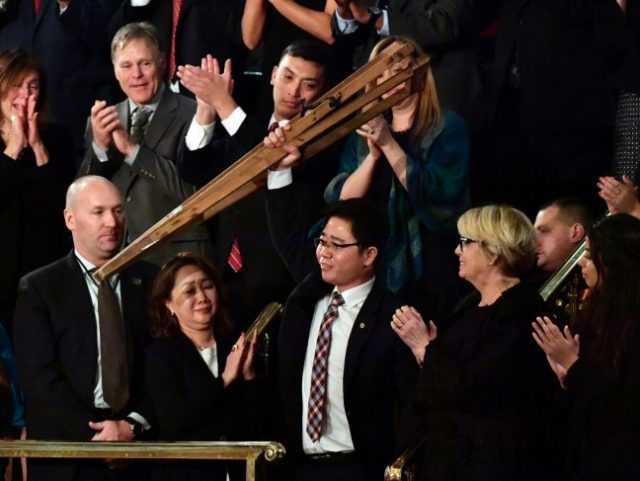President Donald Trump’s State of the Union address Tuesday night focused largely on celebrating the greatness of America. It also took a moment to remind Americans not to take their country for granted, celebrating a North Korean refugee who risked it all to be free.
Ji Seong-ho’s story of losing limbs, risking life anyway, facing torture, and successfully finding freedom brought those assembled to their feet. Especially contrasted with that of Otto Warmbier – a natural-born American who chose to spend his money funding the oppression of people like Ji and, ultimately, himself – Ji’s triumphant moment during the address serves to remind Americans what fighting for freedom really looks like. Perhaps this is why the leftists at Vox called it the “scariest” moment of the night.
And what makes it so powerful is not that it is unique, but that Ji’s resilience is common among those who defect from the most oppressive regime in the world – and not just those forced to starve to death but, increasingly, among the elite circle of communists Pyongyang has long promised a comfortable life.
Ji’s story merits repeating. He told it himself in a story for The Guardian 2014.
“I left North Korea in 2006 because I was in search of freedom. In more simple terms, I wanted to be treated as a human,” he wrote. He dryly recalls losing a hand and foot after being run over by train. Hungry, the 13-year-old fainted on the tracks before the train arrived. He was on the tracks to steal coal out of the train, hoping to sell it for food.
“It was a hard time to eat and survive. In 1995, my grandmother starved to death,” he wrote.
Ji tried to escape and failed before leaving the country for good:
When I returned I was arrested and tortured by North Korean authorities. They took my crutches away. I didn’t know why I was being tortured. The reason was obviously that for anyone who leaves North Korea, they deface the image of the North Korean regime. Because [the authorities] know of citizens using cameras to film, they are afraid of that footage getting out.
The story has a happy ending – his crutches raised high above the American Congress in an act of defiance – and a notable wrinkle that Trump skipped over. Ji’s father was a member of the Korean Workers’ Party, a loyal Kim soldier. When his father finally made the decision to defect, he was caught and tortured to death, his betrayal considered far more severe than that of a suspected ideological deviant.
Ji’s father’s status suggests that the family had a reasonably good songbun, or caste status, in North Korea. How rapidly one starves in North Korea is heavily dependent on songbun, and having good songbun is a matter of coming from a loyal communist family. People with bad songbun – whose relatives have been arrested for crimes like possessing Bibles – are banned from Pyongyang and often forced into agricultural slave labor hundreds of miles from the capital. They are not allowed on the same streets as loyal Party soldiers.
The family with the best songbun in North Korea is, of course, the Kim family. They do not starve.
The crumbs that the Kims feed to other “good” families, it seems, are increasingly not enough. Just as Ji defected, North Korea has been embarrassed by a growing number of defections of those who they claim are thriving in the communist autocracy.
In 2016, 13 workers at a North Korean restaurant in China fled for good. The defection was so embarrassing North Korea still insists it was an abduction. Workers allowed to leave North Korea are among those with the highest songbun, the flashy dancers at its foreign restaurants are often the daughters of the most loyal communists in Pyongyang.
Kim has executed at least six people for these defections. It did nothing to stop North Koreans from running away.
That year, South Korea revealed that Pyongyang had lost a high-ranking intelligence officer to exile, and Pyongyang’s deputy ambassador to London fled his post.
Most recently, North Korea attempted to diminish the importance of the defection of a North Korean soldier tasked with guarding the border with the South, one of the most important jobs in the North Korean military. Pyongyang’s propagandists were unable to spin this one as an “abduction” because security cameras caught the man fleeing. They could not claim the soldier ate well, because South Korean doctors found a ten-inch worm in his stomach. They could not say the man was a coward, because he crossed the most heavily armed border in the world to get away from the Kim family.
Adding insult to injury, the few high-songbun refugees North Korea manages to repatriate don’t seem to stay in North Korea, at least spiritually, for long. In December, a nuclear scientist China returned to North Korea drank poison, killing himself, to prevent North Korea from using his brain to develop weapons.
Then there are the stories of the dead we will never know – the “ghost ships” full of North Korean skeletons that wash up on Japan’s shore every few months and the bodies China cleans up off its border on a regular basis.
These stories are worth telling, especially to Americans, because it is easy to take America for granted. And Trump was right to brand the desires of these defectors just as American as anything fostered within our borders.
“It was that same yearning for freedom that nearly 250 years ago gave birth to a special place called America,” Trump told the audience Tuesday night. “It was a small cluster of colonies caught between a great ocean and a vast wilderness. But it was home to an incredible people with a revolutionary idea: that they could rule themselves. That they could chart their own destiny. And that, together, they could light up the world.”

COMMENTS
Please let us know if you're having issues with commenting.